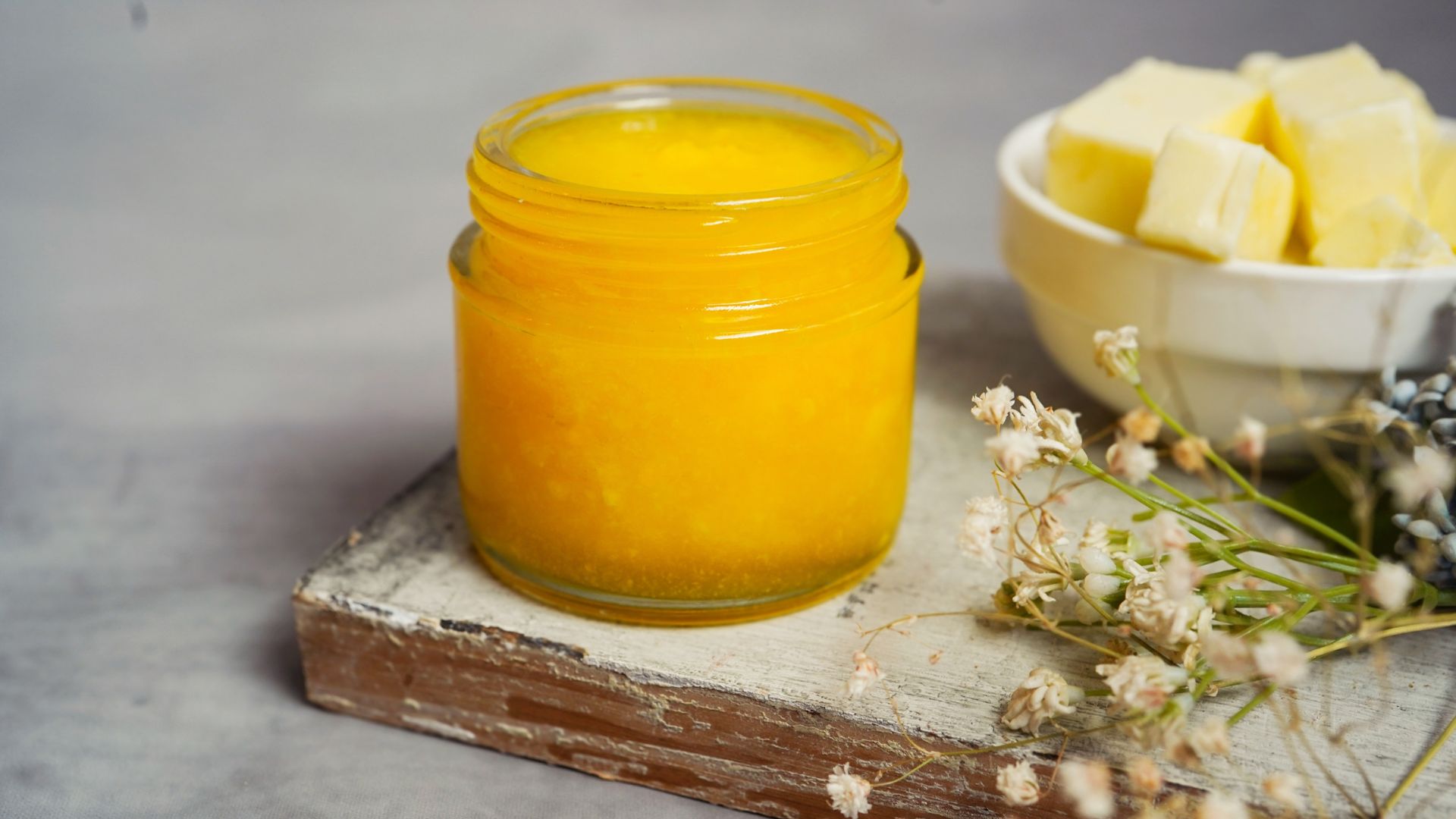
Ghee, a type of clarified butter, has been used in Indian cooking and Ayurvedic medicine for thousands of years. This golden liquid, known for its rich flavor and high smoke point, offers several health benefits. Here's a detailed look at the benefits, risks, and nutritional profile of ghee.
Table of Contents
What is Ghee?
To make ghee, you simmer butter to separate the liquid and milk solids from the fat. After removing the milk solids, you’re left with pure butterfat that has a nutty flavor and aroma. Ghee is popular in cooking due to its high smoke point and holds a sacred place in many cultures.
Nutritional Profile of Ghee
- Calories: Ghee is calorie-dense, with about 120 calories per tablespoon.
- Fats: Each tablespoon contains around 14 grams of fat, primarily saturated fat.
- Vitamins: Ghee is rich in fat-soluble vitamins like A, E, and K.
- CLA (Conjugated Linoleic Acid): Ghee contains small amounts of CLA, which may offer health benefits.
- Butyrate: Ghee provides butyrate, a short-chain fatty acid that supports gut health.
Health Benefits of Ghee
1. High Smoke Point
- Cooking Advantage: Ghee has a high smoke point (around 485°F or 250°C), making it ideal for frying and sautéing without breaking down into harmful compounds.
2. Rich in Essential Vitamins
- Vitamins A, E, and K: These fat-soluble vitamins support vision, skin health, immune function, and bone health.
3. Supports Digestive Health
- Butyrate: Ghee contains butyrate, which may help maintain a healthy gut lining, reduce inflammation, and support digestion.
- Lactose-Free: Since the milk solids are removed, ghee is lactose-free and suitable for those with lactose intolerance.
4. Anti-Inflammatory Properties
- Butyrate Benefits: Butyrate in ghee is known for its anti-inflammatory effects, particularly beneficial for gut health.
- CLA Content: The CLA in ghee may also contribute to reducing inflammation and improving heart health.
5. Heart Health
- Healthy Fats: Although ghee is high in saturated fats, these fats are medium-chain triglycerides (MCTs) which may support cardiovascular health when consumed in moderation.
- Cholesterol Management: Some studies suggest that ghee may increase HDL (good cholesterol) levels.
6. Weight Management
- Satiety: The healthy fats in ghee can help increase satiety, potentially aiding in weight management.
- Boosts Metabolism: Ghee is a source of MCTs, which are known to boost metabolism and support weight loss.
7. Skin and Hair Care
- Topical Application: Ghee is used in Ayurvedic practices for moisturizing the skin, healing wounds, and promoting hair growth.
- Rich in Antioxidants: The vitamins A and E in ghee help combat oxidative stress, promoting healthy skin and hair.
Potential Risks of Ghee
1. High in Saturated Fat
- Heart Disease Risk: Ghee is rich in saturated fats, which can raise LDL (bad cholesterol) levels if consumed in excess, potentially increasing the risk of heart disease.
- Moderation is Key: It’s important to consume ghee in moderation, especially for individuals with a history of heart disease.
2. Calorie-Dense
- Weight Gain: Ghee is calorie-dense, and excessive consumption can lead to weight gain if not balanced with physical activity.
- Portion Control: Mindful portion sizes are crucial when adding ghee to your diet.
3. Allergies
- Milk Protein Sensitivity: Although ghee is largely free of lactose and casein, it may still contain trace amounts, potentially causing reactions in very sensitive individuals.
- Allergy Consideration: Those with a severe dairy allergy should consult with a healthcare provider before consuming ghee.
How to Incorporate Ghee into Your Diet
- Cooking Oil Substitute: Use ghee as a substitute for butter or oil when frying, sautéing, and roasting.
- Spreading: Spread ghee on toast or add it to your morning coffee for a creamy texture.
- Indian Cuisine: Use ghee in Indian dishes like curries, dals, and over rice.
- Baking: Replace butter with ghee in baking recipes for a richer flavor in cakes and cookies.
Final Thoughts
Ghee is a versatile fat with a rich nutritional profile and numerous health benefits. However, like any fat, consume it in moderation, especially if you’re concerned about heart health. By incorporating ghee into a balanced diet, you can enhance flavor and gain essential nutrients, but be mindful of portion sizes to avoid potential risks.
This guide should help you make informed decisions about including ghee in your diet.




Leave a Reply
You must be logged in to post a comment.